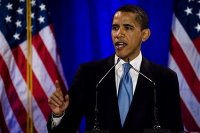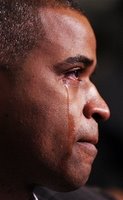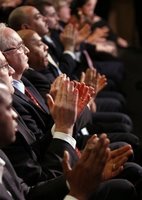 The uncanny similarities between Barack Obama’s presidential campaign and that of John F. Kennedy’s (JFK) in 1960 continue to unfold. Because just as a whimsical media compelled JFK to defend his religious faith as a litmus test for his candidacy, they have now compelled Obama to do the same. More importantly, just as JFK passed that test with flying colors, Obama has done so too.
The uncanny similarities between Barack Obama’s presidential campaign and that of John F. Kennedy’s (JFK) in 1960 continue to unfold. Because just as a whimsical media compelled JFK to defend his religious faith as a litmus test for his candidacy, they have now compelled Obama to do the same. More importantly, just as JFK passed that test with flying colors, Obama has done so too.
I feel obliged to note, however, that Obama faced a far more challenging test. After all, JFK only had to assure pharisaic pundits – many of whom were members of his Catholic church – that his widely respected spiritual leader, Pope John XXIII, would not unduly influence his presidency. Whereas, Obama had to assure them – few of whom are members of his black church – that his widely reviled spiritual leader, Rev. Jeremiah Wright, would not unduly influence his.
 On the other hand, Obama was the first presidential candidate with unimpeachable standing to address the historic tensions between race and religion that have beset America since its founding 221 years ago. And, no doubt, the fact that he is bi-racial figured prominently in this respect.
On the other hand, Obama was the first presidential candidate with unimpeachable standing to address the historic tensions between race and religion that have beset America since its founding 221 years ago. And, no doubt, the fact that he is bi-racial figured prominently in this respect.
Moreover, no one can deny that he not only diagnosed the complex and polarizing issues involved, but also prescribed the best possible remedies to redress them.
Of course, I am acutely mindful that his unprecedented speech had no impact on his preternatural critics; namely, the angry white men whose racial sensibilities most pundits seem to think he had to assuage. Because, for them, Obama can never repudiate Rev. Wright’s controversial remarks convincingly enough. (And I hope the historical irony here is not lost on you.)
Alas, this only confirms the adage that, despite presumptions about affirmative action, (double) standards for blacks in public life are often twice as high or onerous as they are for whites. Indeed, one wonders if the racial sensibilities of these white folks were as troubled when white preachers spewed racist filth from their pulpits that make Rev. Wright’s remarks seem like the Sermon on the Mount by comparison.
 More to the point, however, where was their moral outrage when Ronald Reagan and George W. Bush made pilgrimages to the holy white shrine of Evangelist Bob Jones – a preacher who only tempered his sermons praising Jim Crow laws and damning whites to hell for dating blacks after the IRS threatened to revoke the tax-exempt status of his church.
More to the point, however, where was their moral outrage when Ronald Reagan and George W. Bush made pilgrimages to the holy white shrine of Evangelist Bob Jones – a preacher who only tempered his sermons praising Jim Crow laws and damning whites to hell for dating blacks after the IRS threatened to revoke the tax-exempt status of his church.
And why didn’t the media put Reagan and Bush through the religious crucible they’re now putting Obama through?
Meanwhile, even though Hillary had the good sense to commend his speech, the reaction of her surrogates reeks with political opportunism. Because they’re insinuating that the “lack of judgment” Obama showed by waiting until Rev. Wright’s remarks were broadcast on YouTube to denounce them is just as bad as the lack of judgment Hillary showed by waiting until the war in Iraq was no longer popular to oppose it.
Nevertheless, here, for your edification, is how Obama managed to channel the political grievances, racial prejudices, and economic frustrations of white and black Americans like no black or white politician ever has, or ever could:
On the fact that Rev. Wright’s homilies are the poisonous fruit of the founding documents of America, he said:
The Constitution was stained by this nation’s original sin of slavery…. A Constitution that had at its very core the ideal of equal citizenship under the law…. Yet words on a parchment would not be enough to deliver slaves from bondage, or provide men and women of every color and creed their full rights and obligations as citizens of the United States.
On the purpose and founding principles of his campaign:
[T]o continue the long march of those who came before us, a march for a more just, more equal, more free, more caring and more prosperous America.
On the divisive turn the discussion of race has taken in this presidential campaign in the last couple of weeks:
On one end of the spectrum, we’ve heard the implication that my candidacy is somehow an exercise in affirmative action; that it’s based solely on the desire of wide-eyed liberals to purchase racial reconciliation on the cheap. On the other end, we’ve heard my former pastor, Reverend Jeremiah Wright, use incendiary language to express views that have the potential not only to widen the racial divide, but views that denigrate both the greatness and the goodness of our nation; that rightly offend white and black alike.
On Rev. Wright’s controversial remarks:
I have already condemned, in unequivocal terms, the statements of Reverend Wright that have caused such controversy. For some, nagging questions remain. Did I know him to be an occasionally fierce critic of American domestic and foreign policy? Of course. Did I ever hear him make remarks that could be considered controversial while I sat in church? Yes. Did I strongly disagree with many of his political views? Absolutely – just as I’m sure many of you have heard remarks from your pastors, priests, or rabbis with which you strongly disagreed….
Reverend Wright’s comments were not only wrong but divisive, divisive at a time when we need unity; racially charged at a time when we need to come together to solve a set of monumental problems – two wars, a terrorist threat, a falling economy, a chronic health care crisis and potentially devastating climate change; problems that are neither black or white or Latino or Asian, but rather problems that confront us all.
On the media’s caricature of Rev. Wright and the Rev. Wright he knows:
The truth is, that isn’t all that I know of the man. The man I met more than twenty years ago is a man who helped introduce me to my Christian faith, a man who spoke to me about our obligations to love one another; to care for the sick and lift up the poor. He is a man who served his country as a U.S. Marine; who has studied and lectured at some of the finest universities and seminaries in the country, and who for over thirty years led a church that serves the community by doing God’s work here on Earth – by housing the homeless, ministering to the needy, providing day care services and scholarships and prison ministries, and reaching out to those suffering from HIV/AIDS.
As imperfect as he may be, he has been like family to me. He strengthened my faith, officiated my wedding, and baptized my children. Not once in my conversations with him have I heard him talk about any ethnic group in derogatory terms, or treat whites with whom he interacted with anything but courtesy and respect. He contains within him the contradictions – the good and the bad – of the community that h
e has served diligently for so many years.
On why he can no more disown his “racist” preacher than he can disown his “racist” grandmother:
I can no more disown him than I can disown the black community. I can no more disown him than I can my white grandmother – a woman who helped raise me, a woman who sacrificed again and again for me, a woman who loves me as much as she loves anything in this world, but a woman who once confessed her fear of black men who passed by her on the street, and who on more than one occasion has uttered racial or ethnic stereotypes that made me cringe.
These people are a part of me. And they are a part of America, this country that I love.
(Of course, I know that few, if any, white people will appreciate this juxtaposition of Rev. Wright and his grandmother. But think whatever whites will of Rev. Wright, he was primarily responsible for making Obama the God-fearing, racially sensitive man he is today; whereas, his own grandmother not only personified but also spouted the racism that every black man in America has to deal with everyday.
Moreover, just consider for a moment what psychological damage this white grandmother’s racism, albeit unwitting, could have done to the mind of her little black grandchild.)
On why “the fierce urgency of now” compels this frank and open discussion on race in America:
Race is an issue that I believe this nation cannot afford to ignore right now. We would be making the same mistake that Reverend Wright made in his offending sermons about America – to simplify and stereotype and amplify the negative to the point that it distorts reality.
The fact is that the comments that have been made and the issues that have surfaced over the last few weeks reflect the complexities of race in this country that we’ve never really worked through – a part of our union that we have yet to perfect. And if we walk away now, if we simply retreat into our respective corners, we will never be able to come together and solve challenges like health care, or education, or the need to find good jobs for every American.
On the proverbial chip blacks of Rev. Wright’s generation have on their shoulders:
They came of age in the late fifties and early sixties, a time when segregation was still the law of the land and opportunity was systematically constricted…. For the men and women of Reverend Wright’s generation, the memories of humiliation and doubt and fear have not gone away; nor has the anger and the bitterness of those years. That anger may not get expressed in public, in front of white co-workers or white friends. But it does find voice in the barbershop or around the kitchen table. At times, that anger is exploited by politicians, to gin up votes along racial lines, or to make up for a politician’s own failings….
The fact that so many people are surprised to hear that anger in some of Reverend Wright’s sermons simply reminds us of the old truism that the most segregated hour in American life occurs on Sunday morning.
The anger is real; it is powerful; and to simply wish it away, to condemn it without understanding its roots, only serves to widen the chasm of misunderstanding that exists between the races.
On the commensurate, but rarely acknowledged, chip white Americans have on their shoulders:
A similar anger exists within segments of the white community. Most working- and middle-class white Americans don’t feel that they have been particularly privileged by their race…. So when they are told to bus their children to a school across town; when they hear that an African American is getting an advantage in landing a good job or a spot in a good college because of an injustice that they themselves never committed; when they’re told that their fears about crime in urban neighborhoods are somehow prejudiced, resentment builds over time….
Like the anger within the black community, these resentments aren’t always expressed in polite company. But they have helped shape the political landscape for at least a generation.
On the path America must take now to bridge the lingering racial divide:
For the African-American community, that path means embracing the burdens of our past without becoming victims of our past…. The profound mistake of Reverend Wright’s sermons is not that he spoke about racism in our society. It’s that he spoke as if our society was static; as if no progress has been made….
In the white community, the path to a more perfect union means acknowledging that what ails the African-American community does not just exist in the minds of black people; that the legacy of discrimination – and current incidents of discrimination, while less overt than in the past – are real and must be addressed.
Finally, on why he is uniquely qualified to help America finally honor the promise of its founding principles:
I am the son of a black man from Kenya and a white woman from Kansas…. I’ve gone to some of the best schools in America and lived in one of the world’s poorest nations. I am married to a black American who carries within her the blood of slaves and slaveowners – an inheritance we pass on to our two precious daughters. I have brothers, sisters, nieces, nephews, uncles and cousins, of every race and every hue, scattered across three continents, and for as long as I live, I will never forget that in no other country on Earth is my story even possible.
I would not be running for President if I didn’t believe with all my heart that this is what the vast majority of Americans want for this country. This union may never be perfect, but generation after generation has shown that it can always be perfected.
Enough said!
Except that, for Obama supporters who are dismayed that many whites are using this episode as a pretext for withdrawing their support for him, the following should be instructive:
I have a well-founded suspicion that although many white Americans (Democrats and Republicans) might enjoy a political affair with a black man, they would not want to marry their political loyalties to one by electing him president of the United States. Never mind that – by all other electability criteria – Obama will be the best in his class of presidential candidates in 2008.
[Run Obama run, The iPINIONS Journal, October 24, 2006]
Related Articles:
Obama speech on race
Noel says
Wow!
I belong to a forum of bikers. A lot of the same answers that Barak Obama just gave I addressed in one of our discussions. The majority of the members on this Biker forum are white. To hear them speak you’d think that Rev. Wright was directly responsible for original sin and since he was Obama’s mentor that he too was guilty. Never mind that my argument centered on not assuming that what one person says does not define another persons thinking.
I actually used the argument of my father. My father was the biggest racist I’ve known. But I idolized my father and hung on his every word. I chose to not be like my father. It doesn’t mean that I disowned him just means that I didn’t want to think like him.
As far as Baraks Obama’s speech, all I can say is Wow! I’ve never heard anyone approach such a delicate issue, as race, in such a straight forward and honest way. Expanded my understanding of both sides of the issue.
Obama ’08
Noel